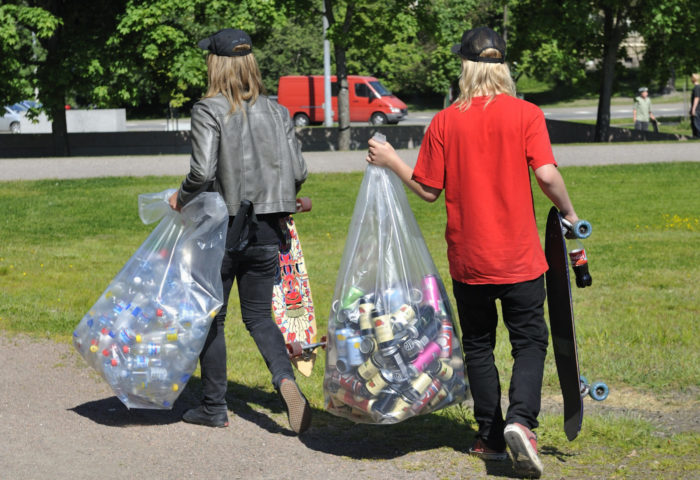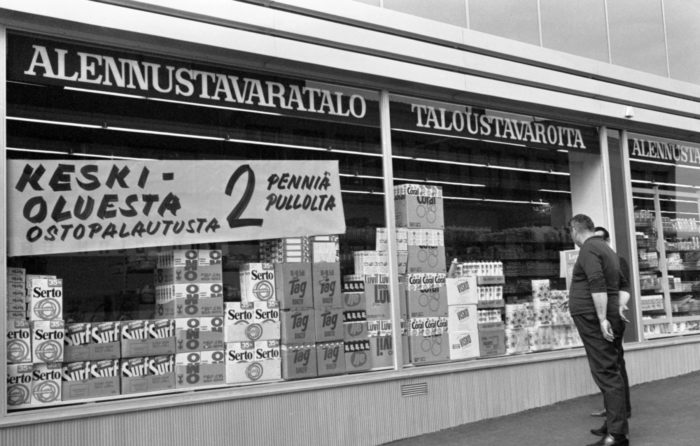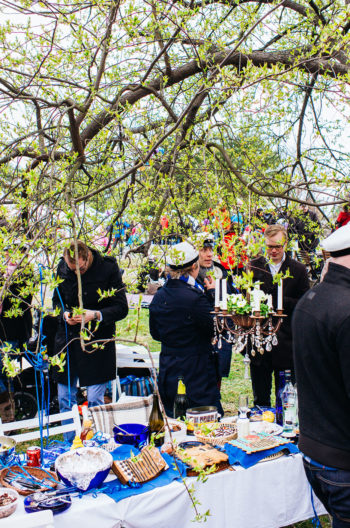Ride Again to Use a Bottle Bank
Beyond Finland, there are about v,000 return machines for bottles and cans. Nigh of them are located in grocery stores, gas stations and kiosks. Y'all put the bottle in and the machine scans it, sorts information technology and problems a receipt then yous can get the deposit money back.
Photo: Heikki Saukkomaa/Lehtikuva
Finland's system for returning drink containers started in the 1950s, and today almost every canteen and can is recycled. Convenience is the cornerstone of the system'due south success.
Finnish residents returned more than two billion bottles and cans in 2020, 93 percent of the full amount purchased in the country. The factors that brand this possible include automated bottle-return machines adult decades agone and the expansion of the arrangement to include plastic bottles in the 2000s.
The Eu directive on single-use plastics has focused boosted attention on bottle recycling and sustainability. Approved by an overwhelming majority of the European Parliament in 2019, the directive stipulates that, by 2029, xc percent of plastic beverage bottles should be recycled. Since Republic of finland handily surpassed that mark years agone, its arrangement is alluring find as a possible solution for use in other countries.
Recycling bottles and cans conserves free energy and raw materials, and reduces litter in cities and wilderness areas. Potable containers get office of the circular economy equally their materials are recycled into new containers or reused in other products.
Manufacturing new cans from recycled aluminium requires only five per centum of the energy that would exist used to brand cans from scratch, and making new glass from recycled glass consumes 30 percent less free energy than manufacturing drinking glass from scratch. (The stats come from the website of Palpa, the nonprofit company that runs Finland's canteen and can recycling operations.)
How it works

These guys have collected abandoned bottles and cans and are going to return them to get the deposit money. Photo: Pekka Sakki/Lehtikuva
The first canteen recycling programmes began back in the 1950s. Present there are almost 5,000 container-return machines beyond Finland. About of them are located in the same shops and kiosks that sell beverages, making returning them a convenient part of people'due south routine. Hotels, restaurants, offices, schools and issue organisers return containers through their potable providers.
Every time a person buys a drinkable in a bottle or can, they pay a deposit of 15 to forty cents. The system covers alcoholic beverages, soft drinks and bottled h2o, in aluminium cans, glass bottles and bottles fabricated from PET plastic.
The return machines are easy to use. You identify a bottle or tin on a set of miniature conveyor belts at the front of the auto. They carry it past a scanner and out of sight. The motorcar sorts the bottles and crushes the cans. When you lot're done, you press a button and the machine gives you a receipt. Plastic bottles are worth xx to xl cents, depending on their size, while drinking glass bottles are worth 10 to 40 cents and aluminium cans are xv cents. The returned containers are recycled or the materials are reused.
When yous nowadays the receipt to the store'due south cashier, they requite yous cash back or deduct the canteen-return coin from your purchase. Palpa processes 360 one thousand thousand euros a year in bottle deposit money.
Tons and tons of bottles and cans

In 1969, this disbelieve store in the southern Finnish city of Kouvola advertised a return payment of two pennies per beer bottle. Photo: Erkki Laitila/Lehtikuva
Across Republic of finland, cans are returned at an average charge per unit of 44 per second, plastic bottles at 17 per second, and glass bottles at 4 per second. Return rates in 2020 totalled 94 percentage for aluminium cans (out of one.4 billion sold), 92 pct for plastic bottles (out of 530 million) and 87 percent for glass bottles (out of 133 one thousand thousand). On average, every Finn returns 373 items in a year: 251 aluminum cans, 98 plastic bottles and 24 drinking glass bottles.
The government has entrusted this function to the private sector. "Palpa is completely nonprofit and receives no government funding," says Tommi Vihavainen, Palpa'southward managing director of producer services, ICT and advice. The visitor's owners include major beverage producers such as Olvi, Sinebrychoff and Hartwall. Around 200 other companies pay membership fees. These companies and Palpa's owners are then exempt from paying packaging taxation on their drink products.
Palpa's turnover amounts to near fourscore million euros, generated from fabric sales, recycling fees and charges for nonreturnable packaging. Information technology uses the coin to keep the arrangement running.
Russian federation, the United kingdom of great britain and northern ireland and other countries take shown interest in the Finnish organization. "Near visitors desire to run into how the return system works in Finland," says Vihavainen. "We don't human action every bit consultants, but nosotros're proud to present our system."
Keeping the metropolis clean

May Day often involves elaborate picnic brunches in public parks, and that ways lots of empty bottles. During this and other large celebrations, contained bottle and can collectors make life easier for cities' sanitation departments by removing the containers. Photo: Jussi Hellsten/Helsinki Marketing
Any bottles that someone happens to go out backside on the street or in a park are snapped upwardly by someone who returns them for the deposit money. The City of Helsinki has noticed that these unofficial collectors profoundly facilitate the life of the urban center during big celebrations such every bit May Twenty-four hour period (April 30 and May one), which often involves elaborate picnic brunches in public parks.
"We only collect sparkling-wine bottles," says Elina Nummi, an urban surround project director with the City of Helsinki. Those are the biggest, heaviest bottles, and they're also very popular on May Twenty-four hour period. "Independent container collectors conduct away the rest. In addition, we've been offering a complimentary movie house ticket for every 20 wine bottles [that someone brings to our collection points]. One year nosotros issued i,500 tickets under this scheme." That'south 30,000 bottles – it must have been quite a party.
Commercial outcome organisers have besides tackled canteen recycling head-on, refusing to permit it become a headache. 1 example is Helsinki'due south Flow Festival, Republic of finland's largest event of its kind, with more than 70,000 visitors attention over the course of three or four days packed with concerts. They use a bottle-deposit arrangement to prompt festivalgoers to make certain the bottles are recycled properly, not abased or left in the regular trash bins.
Susanna Hulkkonen, Flow's press officer, says that they reabsorb all the bottles sold on the bounds. "The toll of the drink includes a eolith: a bottle of wine or champagne is x euros, and all the rest are one euro," she says. Yous can return the canteen to the signal of sale and get your deposit dorsum, or you tin can donate the deposit money to Finnish Association for Nature Conservation past bringing the bottle to their booth on the festival grounds.
Past Evgenie Bogdanov and ThisisFINLAND staff, updated June 2021
Source: https://finland.fi/life-society/circular-economy-success-finlands-recycling-programme-keeps-bottles-and-cans-off-the-streets/
0 Response to "Ride Again to Use a Bottle Bank"
Enviar um comentário